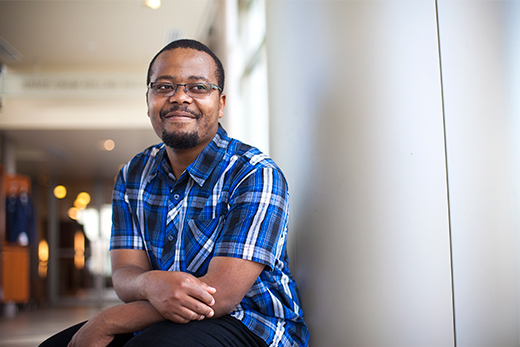Davie Zolowere was working as a physician in the obstetrics ward of a hospital in Malawi when a young HIV-positive woman came in suffering from obstructed labor.
Surgeons at the resource-strapped facility could not maintain a sterile operating room, so after the baby was delivered by cesarean, the woman developed peritonitis.
Over the course of three weeks, Zolowere watched his young patient deteriorate and die. That’s when he decided to cross from the treatment side to the prevention side of the health care equation.
“If you want to make a difference, the hospital is a good place to deal with a problem that has already happened,” says Zolowere, who has worked as district health officer for the Malawi Ministry of Health in addition to his clinical duties. “I have done that for a long time. But I would like to be able to prevent the problem from happening in the first place.”
With that goal in mind, Zolowere came to the Rollins School of Public Health at Emory on a USAID scholarship. He will graduate May 9 with an MPH in global health.
Determined to make the most of what he considered an extraordinary opportunity, Zolowere threw himself into his studies with characteristic fervor. A degree in global health requires 42 credit hours. He took 63.
He met frequently with professors and teaching assistants (TAs) after hours to dig deeper into issues that were broached in class. He was offered two highly competitive slots as a TA. Upon discovering his USAID scholarship prohibited accepting payment, Zolowere promptly offered to do them for free.
“It is so exciting to have students like Davie at Rollins,” says Roger Rochat, professor of global health and epidemiology. “He brings such enthusiasm and works so tirelessly. Everyone here just bent over backwards for him because they recognized how outstanding he is.”
Zolowere also has been an asset to fellow students, bringing a perspective gained from working for six years as a clinician and a health official in a resource poor country. He happily mentored fellow students even before he became a TA.
“Whenever he spoke, everyone around him shut up and listened, because they knew whatever he said would be thoughtful and worth hearing,” says Juan Leon, assistant professor of global health, epidemiology and environmental health.
Returning home to advocate for reproductive justice
Armed with his new degree, Zolowere will return to a country that is making significant strides in public health but is still in need of his type of expertise.
Malawi is known for having one of the most innovative and efficient HIV programs in the world, but one in 10 adults has HIV. Since 1990, the African country has reduced its child mortality rates by 72 percent, but maternal mortality is high. And there is just one doctor for every 40,000 people.
Zolowere is too familiar with the faces and lives behind the statistics. Before coming to Rollins, he treated — and sometimes lost — women suffering from complications of illegal abortions or home births. He worked to get an unending tide of HIV positive patients on antiretroviral therapy. He tried to bring back children wasting away from diarrheal diseases. And many times he was working without water, drugs or sutures.
He plans to use the program management and research skills he gained at Rollins to champion reproductive justice, his true passion. Sex education, access to condoms and other forms of birth control, and freedom for women to make their own reproductive choices top his list of priorities.
“The main thing I take away from my time at Rollins can be summed up from a quote by Dr. William Foege," says Zolowere, citing the renowned epidemiologist who is Presidential Distinguished Professor of Global Health emeritus at Rollins and will give the keynote address at Emory's 171st Commencement.
“He said, ‘The philosophy behind science is to discover the truth. The philosophy behind medicine is to use that truth for the benefit of your patient. The philosophy behind public health is social justice. That's the important point. Public health programs are attempts at social justice,'" Zolowere notes. "I hope to be able to improve social justice in Malawi.”

